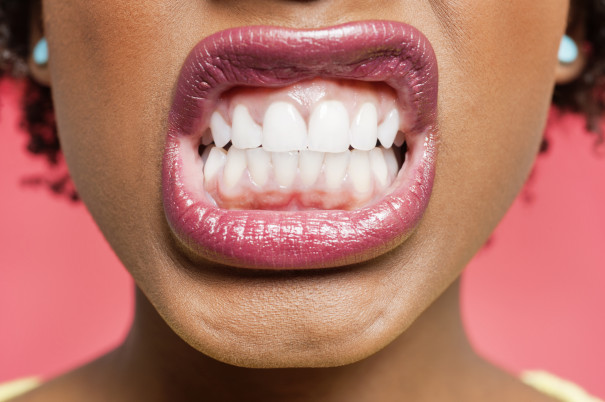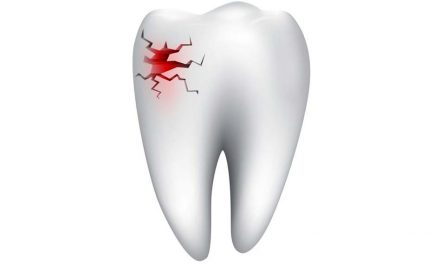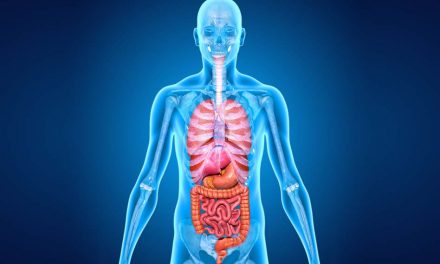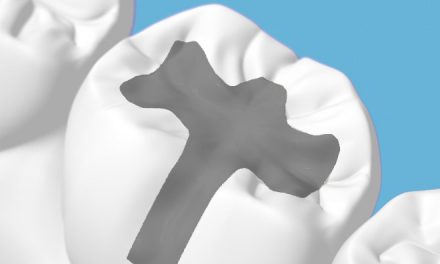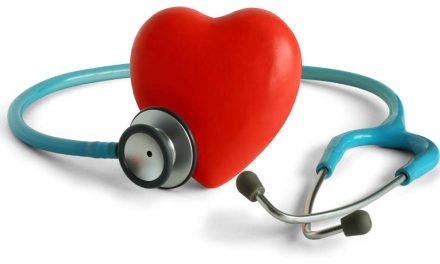Bruxism (or teeth grinding) is an abnormality where the person involved grinds or clenches his or her teeth. Bruxism occurs in most people, but is often mild, or occasional, and does not affect someone’s health. But when tooth grinding becomes more frequent or more severe, it may set off significant complications, leading to serious damage towards the jaws and teeth.
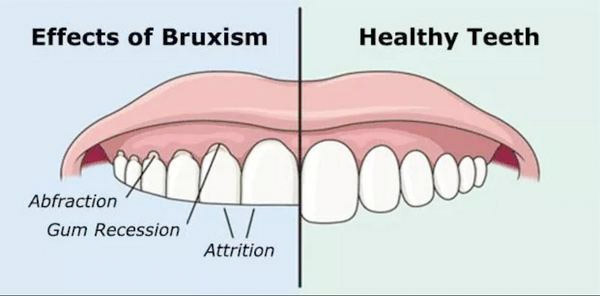
Several reasons that may cause teeth grinding are currently under study. Although they are not yet fully conclusive, there is more and more evidence that show their relationship to bruxism.
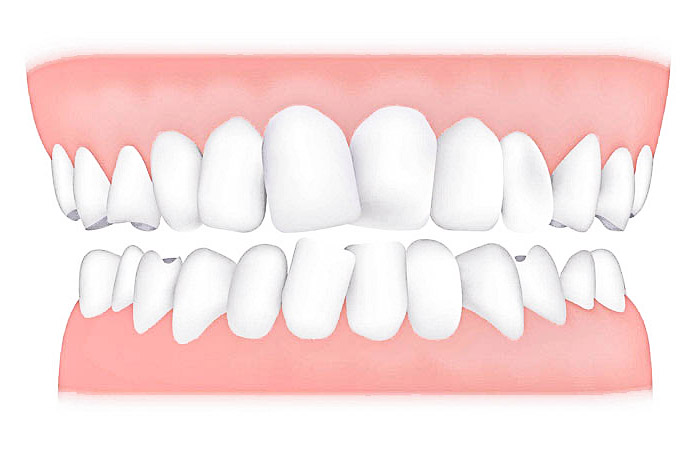 Present research suggests that the most likely reason that causes bruxism is a bad occlusion (alignment) between the teeth of the top and bottom jaws. When you close your mouth and the way that your teeth touch causes stress to your facial muscles and to your jaws, you will tend to unconsciously position your jaws in a place where your muscles will feel less stress. Therefore the teeth move and rub against each other.
Present research suggests that the most likely reason that causes bruxism is a bad occlusion (alignment) between the teeth of the top and bottom jaws. When you close your mouth and the way that your teeth touch causes stress to your facial muscles and to your jaws, you will tend to unconsciously position your jaws in a place where your muscles will feel less stress. Therefore the teeth move and rub against each other.
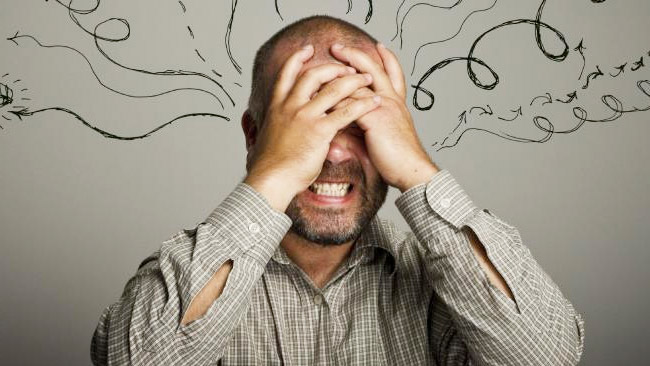 Anxiety or stress in someone’s life is also thought to be one of the causes of bruxism. A person leading a stressful lifestyle is more apt to grind his or her teeth at night, and sometimes even during daytime. One of the recommendations is to reduce the amount of caffeine intake to feel less anxiety.
Anxiety or stress in someone’s life is also thought to be one of the causes of bruxism. A person leading a stressful lifestyle is more apt to grind his or her teeth at night, and sometimes even during daytime. One of the recommendations is to reduce the amount of caffeine intake to feel less anxiety.
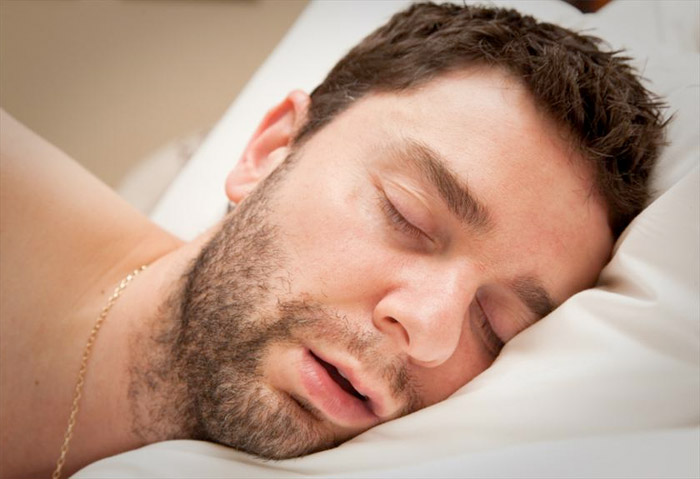 It is also thought that tooth grinding might occur when someone suffers from sleep arousals. Bruxism is therefore observed during a period of sleep that involves movements, emotions and abnormal dreams that are unconscious. Recent studies also concluded that bruxism is related to snoring and sleep apnea.
It is also thought that tooth grinding might occur when someone suffers from sleep arousals. Bruxism is therefore observed during a period of sleep that involves movements, emotions and abnormal dreams that are unconscious. Recent studies also concluded that bruxism is related to snoring and sleep apnea.
 Researshers believe that taking various medications, or recreational drugs, may cause the development of bruxism. These substances include a few antidepressants, a few antipsychotics, some amphetamines, as well as cocaine and alcohol. It is also believed that tooth griding might be associated to some conditions like Huntington’s disease, Parkinson’s disease, Down syndrome, autism, epilepsy, and a few more.
Researshers believe that taking various medications, or recreational drugs, may cause the development of bruxism. These substances include a few antidepressants, a few antipsychotics, some amphetamines, as well as cocaine and alcohol. It is also believed that tooth griding might be associated to some conditions like Huntington’s disease, Parkinson’s disease, Down syndrome, autism, epilepsy, and a few more.
References
- Wikipedia (Bruxism).
- The Bruxism Association (Causes of bruxism).
The information above should be used as a reference only. Any medical decision should not be taken before consulting a health care professional.
The masculine gender may have been more used in the article, but without prejudice, to make reading easier.
Category: questions and answers
- Are dental x-rays safe for pregnant women?
- Are teeth alive?
- At what age do children’s teeth start coming out?
- Can an abscess cause a tooth to break apart?
- Can dry mouth be harmful?
- Can heart disease be related to dental care?
- Can teeth grinding affect children?
- Can wisdom teeth move other teeth?
- Can you drink alcohol after tooth extraction?
- Do you have to remove retainers or orthodontic appliances when you eat?
- Does chewing gum after a meal help eliminating dental plaque?
- Does chewing gum eliminate bad breath?
- For which sports should you use a mouthguard?
- How can smokers take care of their oral health?
- How can you get rid of a tooth abscess?
- How can you get rid of an ulcer or a canker sore on your tongue?
- How can you prevent a tooth abscess?
- How can you reduce the effects of dry mouth?
- How can you tell if you have a tooth abscess?
- How can you tell that you are grinding your teeth?
- How can you tell that you have dry mouth?
- How can you treat a tooth abscess?
- How can you treat dry mouth?
- How can you treat teeth grinding?
- How does smoking affect oral health?
- How does smoking affect overall health?
- How is infective endocarditis related to oral health?
- How long does it bleed after wisdom teeth extraction?
- How long does the numbing last after a dentist appointment?
- How many teeth are there in the mouth?
- How soon after tooth extraction can you use a straw?
- How thin are dental veneers?
- Is a root canal painful?
- Is amalgam in teeth (grey fillings) bad for your health?
- Is it necessary to place a dental crown on a tooth that had a root canal?
- Is it normal for gums to bleed when you brush your teeth?
- Is it painful to place a dental implant in your mouth?
- Is smoking bad for your teeth?
- Is there a relationship between dental problems and overall health problems?
- Should people that had a heart attack take precautions when undergoing dental treatments?
- Should people that have a pacemaker take special precautions with their dental care?
- Should people that have had coronary artery bypass surgery take special precautions with their dental care?
- Should people that suffer from congestive heart failure take special precautions with their dental care?
- Should people with angina take precautions when undergoing dental treatments?
- Should people with high blood pressure take precautions when undergoing dental treatments?
- What are the advantages of silver fillings?
- What are the symptoms of having a tooth abscess?
- What can you eat after wisdom teeth extraction?
- What diseases might cause you to have dry mouth?
- What lasts longer, grey or white fillings?
- What may happen if you don’t treat a cavity?
- What might cause you to grind your teeth?
- What might happen if you don’t treat a tooth abscess?
- When can you eat and drink after a tooth filling?
- When can you play sports after wisdom teeth surgery?
- When can you smoke after a tooth extraction?
- When do dissolvable stitches fall out after wisdom teeth extraction?
- Where does a tooth go after extraction?
- Which is better retainers or braces?
- Why are wisdom teeth called “wisdom teeth”?
- Why is teeth-grinding bad for you?
- Why you should not smoke after tooth extraction?
- Will taking antibiotics make the colour of your teeth darker?

